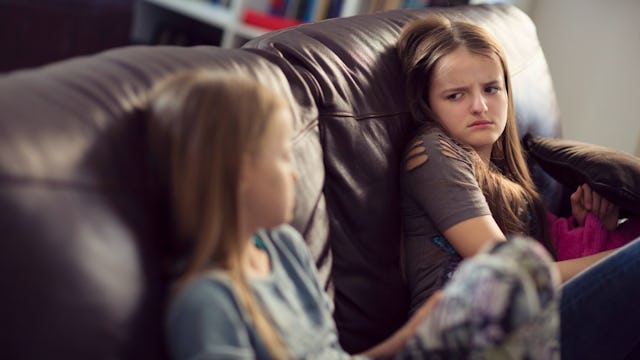4 Tips For Surviving An Angsty Tween

I have a breaking point. I think it’s safe to say we all do.
As parents, our days are often — what’s a nice way to say this — spiced up with “phases” our kids go through. There are Sleep-Issue phases and Crying phases and Needy phases (sometimes all at once). Right now, in my house, there’s a new phase I’ve named The Angsty phase. My oldest tween has turned into a crotchety, scowling shrew the moment she wakes in the morning.
I’d like to say I maintain a calm, zen-like poise through sassy retorts, rolling eyes and blatant disrespect.
I mean, if an adult — a peer or a friend — talked back to me or made a face like she drank expired milk I would be in utter shock (unless she drank expired milk). Of course, my newly angsty tween is polite once she steps out our front door. She’s a delight in public to her teacher and classmates (or so I’m told). While that’s a relief, it doesn’t make me feel better at home. In the beginning of this phase, I found myself repeating these excuses for her behavior:
– Sleep. She didn’t get enough sleep.
– Stress. She’s stressed and anxious about the new school year.
– Food. She needs food.
These fall flat, however, when I admit to myself that she gets to bed on time, is loving school, and is not starving.
After one particularly snarky morning, I told her that I was going to count her facial expressions and condescending comments and when I got to 10, she owed me a dollar. Luckily she does not like to spend, or lose, money so this did the trick that day.
It’s hard thinking of something on the fly that is both impactful and doesn’t also affect my life and ruin another mom’s afternoon (like taking away a playdate or a sleepover). Though I acknowledge that those are powerful tools and I could be pushed to do it. I am Mom, hear me roar.
So why is my oldest tween suddenly hailing from Planet Rude?
I know the answer; we all do. It’s hormones combined with the rumblings of a newfound, innate desire to seize independence and to stand apart, alone. Which is what she needs to be in these moments. Alone. And that’s hard for me, probably for many parents, since my go-to has always been to hug her when she’s feeling out of sorts. I’ve always encouraged her to talk to me when she’s struggling. But we’d reached a point at which we needed a new approach.
Ignore it, don’t ignite it.
It’s really very simple, though less so in practice:
1. Be quiet.
For me, this is hard because I’m a talker. I tend to ask and prod and push to get the words flowing. But now I’m learning to keep my mouth shut. I turn my back, focus on something else. The other day, I put on my headphones and cranked music while doing dishes just to stop the back-and-forth. If you can’t talk, you can’t yell, emotions won’t bubble over and this quiet space allows for thought and reflection. For both me and my daughter.
2. Go away.
When we’re in the thick of it, negative energy escalates and we need space from one another. I start by instructing her to take a break, to go to her room, take a walk, or sit in the hammock. But sometimes she refuses to move from her spot. In these cases, I leave. It’s amazing how much better I feel, and just ten minutes apart can diffuse the tension and disarm my daughter.
3. Wait. Be patient.
The kids we know and love are still inside their newly emotional skins that are prickly to the touch. If we allow them their space, don’t push them on topics they can’t or don’t want to discuss and don’t engage when they’re irrational, they will come around. In fact, often they emerge and their regret is evident in their faces. If they had tails, we would see them wedged between their legs.
4. Talk later.
After whatever incident transpired and time has passed, perhaps the school day is over and everyone is in a different state of mind, you can talk. Ease in with typical, safe questions. Once you verify your kid is in a good frame of mind you can talk calmly about what happened. I find the word “disappointed” extremely effective when I tell my kid how I felt about her behavior. Yes, it makes her feel bad. As it should. To date, every time we have one of these conversations, she apologizes and we end up in a good place for the rest of the day.
Things have improved with my new approach, and I recommend trying it if you’re hitting a wall with your own tween. The last morning that my daughter blew up at the family, we maintained our calm and didn’t give her attitude any of our attention. Still tightly wound, she walked out our front door on her way to school. At the end of our driveway, she turned back and in her eyes I saw a four-year-old who wanted desperately to run back for a hug, but instead offered a wave and enormous brown eyes. It’s just a phase, I told myself for the umpteenth time. But it’s the truth.